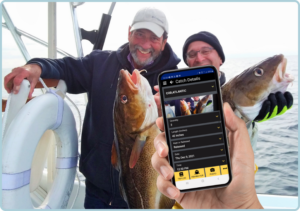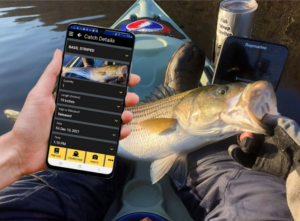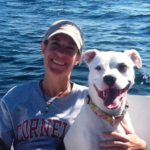Much of the attention over the past few years in electronic reporting has focused on the commercial and for-hire fishing industries. Until recently, these two sectors reported data on paper logs that were sent to fisheries managers via snail mail. When corrections were needed, captains received a letter in the mail along with their paper logbooks and requested
 changes or fixes. Corrections made—and a stamp and envelope later—reports would be sent back to the requesting agency to be manually entered into a database.
changes or fixes. Corrections made—and a stamp and envelope later—reports would be sent back to the requesting agency to be manually entered into a database.
Although I feel like I am dating myself, the truth is that electronic reporting has only been around for a handful of years. Harbor Light Software, working on behalf of the Atlantic Coastal Cooperative Statistics Program (ACCSP), developed the eTRIPS mobile electronic reporting platform used by commercial and for-hire captains from Maine to Texas to report their catch and effort. Unlike paper logbooks, electronic trip reports offer users instant verification and feedback of their reports. Users of electronic trip reporting tell us that the use of paper logbooks is now in the rear-view mirror forever.
But what about the recreational fishing sector? How do we better determine catch and effort in this growing group of anglers? That question is bubbling up to the surface of recent fisheries management discussions.
Enter the mobile app, AnglerCatch. A unique citizen science project put forward by the State of Rhode Island and the Rhode Island Saltwater Anglers Association (RISAA), funded in 2021 by a grant from the National Fish & Wildlife’s (NFWF) Electronic Monitoring and Reporting Grant Program. Since Rhode Island was the epicenter of development of electronic reporting in for-hire  and commercial fisheries, they were quite adept at taking on a new challenge of voluntary recreational trip reporting.
and commercial fisheries, they were quite adept at taking on a new challenge of voluntary recreational trip reporting.
New England recreational anglers had been asking for a feedback mechanism to provide fishing data for over ten years, specifically on Striped Bass and Black Seabass, two species with a very high discard rate in the region. Understanding the magnitude of discards is imperative, as many species have associated discard rates that are otherwise unaccounted for. Further, recreational discard data is increasingly important as more recreational species are under regulatory action aimed at reducing harvest. The resulting shortened fishing seasons, lower bag limits, and increased minimum sizes have resulted in more fish being discarded at sea and therefore not available for direct observation and measurement.
Anglers and fisheries managers had a sense that the current method of collecting recreational fishing data through the Marine Recreational Information Program (MRIP), could be strengthened and supplemented, resulting in better data to inform fisheries management decisions. Fisheries managers and anglers identified what they felt were drawbacks of MRIP’s Access Point Angler Interview Survey (APAIS). That survey collects catch rates via in-person or dockside interviews, which can suffer from anglers’ recall bias, or may not include a full picture of their catch. The random nature of the MRIP survey also does not guarantee an opportunity for all anglers to provide data about their fishing activity on a regular basis. As such, many anglers stated their lack of input left them feeling disenfranchised with MRIP. APAIS interviewers are often not allowed to conduct interviews at private docks, so catches landing at those docks go uncollected. Lastly, some charter captains began telling their anglers not to participate or speak with APAIS personnel, as they felt the data collected through the program did not accurately reflect what they saw on the water. Giving anglers a tool to provide data about their fishing effort, while complementing MRIP to help fill in data gaps, was seen as a win/win for both anglers and fishery managers.
The AnglerCatch project began with RISAA sending surveys to 1,100+ of its core members to gauge interest in voluntary catch reporting. 223 anglers responded, with a good mix of fishing segments represented; offshore, surf/shore, and even 32 kayak anglers were interested in providing data. From these respondents, RISAA established an electronic reporting panel consisting of anglers with varying fishing-method perspectives to guide the project through inception, roll out, and into the future. This diverse angler panel provided input on the project while its members acted as program ambassadors and encouraged their colleagues to engage with the AnglerCatch program. Next, ideation sessions were held with 10-15 anglers in a group who were tasked to provide input on the following questions, “What would encourage anglers to engage in our trip reporting pilot?” and “What kinds of application program features would keep anglers engaged in year two, three, and into the future?” Their feedback was then used to develop an angler survey that was sent to over 7,500 affiliated RISAA members. The goal of this survey was to build consensus on key program initiatives and launch activities.
Unlike paper logbooks, electronic trip reports offer users instant verification and feedback of their reports. Users of electronic trip reporting tell us that the use of paper logbooks is now in the rear-view mirror forever.
Feedback from the panel, the ideation groups, and the survey focused on providing data to fisheries management as the most important part of the project. Project personnel did a good job managing anglers’ expectations in this early stage so the fishermen understood that using their data for management decisions would take time and additional work.
The anglers on the panel were clear in their feedback; their motivation to provide data was not only for the short term, but the long term as well. As a group, they saw themselves as an additional source of data, one often overlooked. The anglers explained that citizen science and voluntary reporting were noble ideas, but they believed there should be incentives for them to continue to provide data after the first season. Feedback pointed to providing the angler with free “fishing tools” such as weather, buoys, tides, regulations and solunar data that would help them fish better. Enter the concept of “A fishing logbook, with a purpose”.
The idea behind AnglerCatch was to mimic the APAIS interview wherever possible, with questions such as:
“Was your fishing effort > or < three miles from shore?”;
“What was your fishing mode?” i.e. Charter/private/pier/beach/bank;
“What was your gear type?”; and
“What was your target species?”
The application was built using the MRIP standards for data fields for things such as species, gears, and fishing mode, with the intention of delivering the data collected to the same agency that collects APAIS data, the Atlantic Coast Cooperative Statistic Program, ACCSP.
Although AnglerCatch rolled out at the end of fishing season 2021, the expanded fishing tools and marketing for the app did not occur until 2022. Utilizing the app, RIDEM was able to capture details, including lengths, of kept and discarded fish on just under 500 catches. These data are currently being reviewed by RIDEM while we continue to move forward with development on the app.
We are excited to announce that AnglerCatch has received additional funding from the ACCSP for 2023 that will allow continued development on the mobile app. Through a program with ESRI, Harbor Light will be adding in features such as nautical mapping. Other features will include fishing regulations displayed within the app, and additional work will be completed to facilitate sending these data to the ACCSP data warehouse where it will be available to all East Coast partners.
Fran Karp is Chief Operating Officer at Harbor Light Software. She welcomes your questions and comments about AnglerCatch or any of the company’s other initiatives. Projects in the Field is a series of independently produced articles profiling work supported by NFWF’s Electronic Monitoring & Reporting Grant Program, and is meant to raise awareness and support for these important initiatives.
